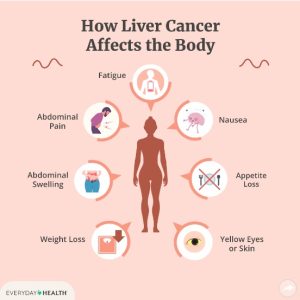Liver cancer is a type of cancer that starts in the cells of your liver. The liver is an important organ in the upper right portion of your abdomen. The liver performs various important functions, including filtering toxins from your blood, producing bile for digestion, and storing nutrients such as glucose so you remain nourished when you’re not eating. It also breaks down toxins and medications.
When cancer develops in this important organ, it can disrupt these critical processes and pose serious health risks.
In this article, we guide you on what liver cancer is, how it is diagnosed, the treatment options available, and how to cope with its challenges.
Let’s understand liver cancer from A to Z.
What Is Liver Cancer?
Liver cancer develops in the liver, your body’s biggest internal organ.
Your liver sits in the upper right part of your belly, just below your ribs. One of its main jobs is making bile, a liquid that helps digest fats and vitamins.
When cancer grows in the liver, it hurts liver cells and affects the liver’s process of working.
Liver cancer comes in two types: primary and secondary.
Primary liver cancer starts in the liver’s cells. Secondary liver cancer develops in another part of the body and spreads to the liver.
These cancer cells can move away from where they started. They can move through your blood or lymphatic system to other parts of your body and start growing there.
Every year, over 800,000 people worldwide are diagnosed with liver cancer. Liver cancer is also one of the leading causes of cancer deaths worldwide every year.
Who Might Get Liver Cancer?
Cancer specialists believe that the increase in obesity and hepatitis C is a liver infection of the liver that can become chronic. Other factors that increase the risk include:
Age: Liver cancer is very common in older adults. About 3.1% of individuals diagnosed with liver cancer are under 45 years old.
Gender: Liver cancer is more common in men than in women.
Exposure to Certain Substances: Exposure to certain chemicals and toxins, such as aflatoxins and vinyl chloride, can increase the risk of liver cancer.
Lifestyle Factors: Factors such as obesity, heavy alcohol consumption, and a diet high in processed foods can also risk you to develop liver cancer.
Liver Cancer Symptoms
Many people don’t experience any symptoms in the early stages of liver cancer. When liver cancer symptoms do show up, they may include:
- Unexplained weight loss
- Abdominal discomfort, pain, and tenderness, especially in your upper abdomen
- Loss of appetite
- Whites of the eyes or yellowing of the skin (jaundice)
- Pain in the upper abdomen
- Swelling or bloating of the abdomen
- Nausea
- vomiting
- Weakness
- Fatigue
- Chalky, white stools
- Dark-colored urine
- Easy bruising or bleeding
- feeling sick every day

Types Of Liver Cancer
Liver cancer comes in many different types. Each one relates to a different part of the liver or an affected type of liver cell. Primary liver cancer can begin as one lump or in multiple spots in your liver at the same time.
Here are some various types of primary liver cancer:
- Hepatocellular carcinoma
This liver cancer is the most common type of primary liver cancer. This starts in liver cells called hepatocytes. A very rare subtype, fibrolamellar Hepatocellular carcinoma, begins in teens and young adults without a history of any kind of liver disease.
- Intrahepatic cholangiocarcinoma (bile duct cancer)
This type of liver cancer starts in the cells that line the bile ducts. The bile ducts are tubes in the liver that have the important job of transporting bile to the intestines. This type represents between 10 per cent and 20 percent of primary liver cancer cases.
- Hepatoblastoma is a very rare liver cancer that usually affects children younger than 4 years old.
This primary liver cancer is a rare type of liver cancer. Hepatoblastoma is nearly found in children, especially under age 3-4.
With surgery and chemotherapy, Hepatoblastoma cancer can be cured about 70 % of the time.
- Angiosarcoma and hemangiosarcoma
Angiosarcoma is a very rare type of liver cancer that develops in the blood vessels of the liver. It is a kind of soft tissue sarcoma. Angiosarcomas can also start in other blood vessels or in lymph vessels.
When angiosarcomas develop from blood vessels, they are called hemangiosarcoma.
Secondary Liver Cancer
-
- bowel cancer
- breast cancer
- cancer of the pancreas
- stomach cancer
- cancer of the oesophagus (gullet)
- lung cancer
- melanoma
- neuroendocrine tumours
Sometimes, when cancer spreads to the liver from another part of the body, people already know they have cancer. But in some cases, liver cancer is discovered before doctors find the main source of the cancer. This situation is called “cancer of unknown primary.”
How is Liver Cancer Diagnosis?
Like with many cancers, finding early liver cancer gives a better chance for a good liver cancer treatment. Sometimes, doctors monitor people at risk of catching the disease sooner.
Here are some common tests and procedures used for liver cancer diagnosis:
- Blood tests can show if there are any problems with how your liver is working or if there are signs of liver cancer.
- Imaging tests like ultrasound, CT scans, or MRI scans give doctors a closer look at your liver to check for any issues.
- Liver cancer Biopsy means taking a small piece of tissue from the liver to test it for cancer in a lab.
- Angiogram involves injecting dye into an artery to check for tumours in the liver.
- Laparoscopy is a type of surgery that uses small cuts and special tools to look inside the liver.
Liver Cancer Stages
Liver cancer stages describe how far the liver cancer has spread and how advanced it is. The liver cancer stages range from 0 to 4, with 0 starting early and 4 being advanced.
Your cancer doctor will use different tests to recommend the best treatment for liver cancer. They look at:
- Your physical exam.
- Imaging tests like CT, MRI, or ultrasound.
- Liver cancer biopsy, which is taking a small sample of liver tissue.
- Any liver diseases you have, like cirrhosis.
- If cancer affects your portal vein.
This information helps doctors know:
- How big the main tumour is.
- If nearby lymph nodes are affected.
- If cancer has spread to other parts of the body.
Here are the stages of the most common liver cancer, HCC:
- Stage I: One tumour, no veins or lymph nodes affected
-
- IA: Tumor is 2 cm or smaller
-
- IB: Tumor is larger than 2 cm
- Stage II:
-
- A single tumour larger than 2 cm has grown into blood vessels
-
- Multiple tumours, none larger than 5 cm
- Stage III:
-
- IIIA: Multiple tumours, at least one larger than 5 cm
-
- IIIB: Tumor(s) grown into a major liver vein or invaded adjacent organs
- Stage IV:
-
- IVA: Cancer spread to nearby lymph nodes
-
- IVB: Cancer spreads to distant parts of the body
Treatment and Medication for Liver Cancer
Cancer specialists recommend treatment based on many factors, like how advanced the liver cancer is spread and overall patient’s health.
Surgery for Liver Cancer
Here are surgical options to treat your liver cancer:
Tumour removal: Sometimes, cancer doctors can take out the tumour from the liver along with some healthy liver tissue around it.
Liver transplant: If the liver is sick because of cancer, it can be replaced with a healthy liver from a donor. But not everyone can have this surgery. Doctors decide based on how bad the cancer is if it has spread, and if there are other health problems.
Other Procedures
Experts have many additional treatment options for liver cancer. These include:
Radiofrequency ablation uses electricity to heat and destroy cancer cells. Similar methods use microwaves or lasers.
Cryoablation freezes and destroys cancer cells by placing liquid nitrogen directly into the liver tumour.
Alcohol injection involves injecting pure alcohol into tumours with a needle, causing cancer cells to die.
Chemoembolization injects chemotherapy drugs directly into the liver.
Radiation beads placed in the liver deliver radiation directly to the tumour.
Radiation therapy uses high-energy beams to kill liver cancer cells. There are different types, like external beam radiation (beams directed at the liver) and stereotactic radiation (many beams focused at one point in the liver).
Medications for Liver Cancer
Here are some medications used to treat liver cancer:
Targeted drugs for liver cancer block the bad stuff in cancer cells. They include medicines that stop certain proteins from helping tumours grow and immune system proteins made in a lab that recognize and fight cancer cells.
Immunotherapy gets your own immune system to fight cancer cells. Medicines targeting immune checkpoints, which are like switches on immune cells, are used for liver cancer.
Chemotherapy uses drugs to kill liver cancer cells, usually when other treatments haven’t worked.
Understanding liver cancer survival rates
Survival rates tell us how many people live for a certain amount of time after being diagnosed with cancer. They usually talk about how many people are still alive 5 or 10 years after finding out they have cancer.
What Are the Liver Cancer Treatment Success Rates?
Liver cancer has a 5-year survival rate if the cancer is found and treated early.
Here are the 5-year survival rates:
- Overall, about 17% of people with liver cancer survive for 5 years.
- If the cancer is found before spreading outside the liver, about 31% of people survive for 5 years.
- If the liver cancer has spread to nearby lymph nodes or organs, about 11% of people survive for 5 years.
- If liver cancer has spread to other areas of the body, only about 3% of people survive for 5 years.
Find Hope in Every Moment
Dealing with a liver cancer diagnosis can feel like a lot to handle. It’s important to reach out to the people in your life who can support you through this tough time, like family and friends.
If you’re feeling stressed or anxious, talking to a counsellor can really help. If you are seeking special treatment, then consider visiting Oncowin, the best liver cancer hospital in Ahmedabad.
Remember, liver cancer can often be treated. Make sure to talk to our expert cancer doctor about any new symptoms or side effects from treatment. Our doctor can adjust your treatment plan to help you feel better and more comfortable.
Read also more blog howtoimpress.in .




